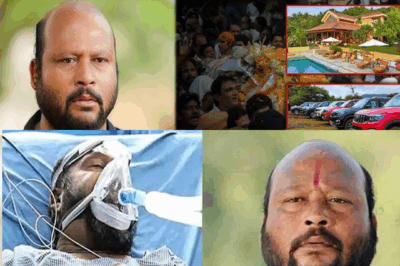She was young. Bright. Full of dreams. But on that fateful evening, Radhika Yadav’s voice trembled on the phone—her final words recorded, her fear palpable. And now, days after her murder stunned an entire city, it is that very last call that has blown open the case and turned the finger of suspicion toward someone unthinkable: her own father.
In a shocking twist that no one saw coming, the investigation into Radhika’s death has taken a chilling turn. Authorities, previously fumbling through theories of robbery and stalkers, have now uncovered audio evidence that may reveal the truth Radhika couldn’t speak openly but desperately wanted someone to hear. “Papa… agar main nahi rahi to sab kuch batana,” she whispered to her best friend minutes before she vanished. That line—now viral, now echoed by millions—may hold the key to the mystery.
Radhika, a 22-year-old college student, was found dead near a construction site just outside Bhopal. At first glance, the scene resembled a mugging gone wrong. But friends and classmates who knew Radhika insisted she wasn’t the kind to walk alone at night, especially not in such areas. The inconsistencies started stacking up. And then came the call.
Her final conversation was recorded, not intentionally, but thanks to an automatic call recorder app. Her friend, who received that chilling call, was too late to intervene—but brave enough to hand over the evidence. Police investigators, upon hearing the 3-minute audio, were reportedly stunned. The voice was soft but urgent. Radhika mentioned threats. She mentioned fear. And in a barely audible breath, she mentioned her father.
What followed has left the nation rattled. Radhika’s father, Mahesh Yadav, a respected retired government clerk, had always maintained a composed, grieving exterior in front of the cameras. He cried during interviews, pleaded for justice, and held prayer meetings. But behind that façade, investigators now believe, was a man hiding something sinister.
Neighbors have come forward. Whispered stories of conflict at home, of a daughter growing increasingly rebellious, of a father unable to control her choices. Radhika had recently started dating a classmate from a different caste—something Mahesh vehemently opposed. “He would shout at her,” a neighbor claimed. “We thought it was just a strict father-daughter thing. Now, we’re scared.”
When police obtained CCTV footage from the street leading to the site of the murder, a familiar vehicle appeared—Mahesh’s white Maruti, parked not far from the scene hours before her death. Confronted with the footage, Mahesh reportedly broke into tears and asked for time to explain. But time is not on his side anymore.
The community is in disbelief. How could a father, a man trusted and respected for years, possibly do this? “There’s something deeply wrong when a girl cannot feel safe even inside her own home,” said Inspector Renu Sharma, head of the case. “Radhika’s voice from that call is haunting. She was pleading. She knew something bad was going to happen.”
Perhaps the most haunting part isn’t the accusation, but the silence that surrounded it all these years. Radhika had confided in her friends. She had hinted at fear. But no one, not even her closest allies, imagined that the danger could be coming from the very person who raised her.
The audio clip, now being used as primary evidence, has been sent for forensic analysis. Experts say the background noise suggests she wasn’t at home, but close—possibly in her father’s car. That detail, paired with the timeline of Mahesh’s movements, could be crucial in court. For now, police have taken him into protective custody—“for his own safety,” they say, though public outrage continues to grow.
Social media has exploded with tributes to Radhika. Her classmates have held candlelight vigils, painting banners that say “Justice for Radhika” and “Listen to Her Last Words.” Influencers, actors, and even local politicians have weighed in, demanding full transparency and swift action.
Her mother, Rekha Yadav, has remained mostly silent. In a heartbreaking interview with a local TV channel, she said, “I have lost my daughter. If her death brings light to other girls’ suffering, let it. But if my husband had anything to do with this… I don’t know if I can live with that.”
It’s a moment the nation cannot ignore. Radhika’s death is not just another crime—it is a mirror, forcing society to look at how family honor, caste rigidity, and patriarchy still govern choices. Her last call wasn’t just a cry for help—it was an alarm bell.
As the investigation continues, more details are expected to emerge. But one thing is already certain—Radhika’s voice will not be silenced. Not now. Not ever.
News
Ankita Lokhande’s Shocking Decision After Personal Tragedy: Is She Leaving Acting Forever?
When Stardom Meets Silence: Ankita Lokhande’s Quiet Exit from the Spotlight There are some stories that don’t begin with applause…
Shilpa Shirodkar’s Sudden Health Rumor Shocks Fans: What Did the Director Say?
A Storm of Lies: How Shilpa Shirodkar Became the Victim of Her Own Director’s Rumor It started like a spark,…
SRK’s ‘King’ Film Turns Nightmare: What Really Happened on Set?
The lights were blazing, the cameras ready. All eyes were on Bollywood’s undisputed king as he stepped onto the set…
Salman Khan and the Delivery Boy: A Midnight Encounter That Melted Hearts
It was close to midnight in Bandra, Mumbai. Salman Khan had just wrapped a grueling day on set. Exhausted, he…
Shah Rukh Khan and the Orphan Boy: A Heartwarming Encounter That Changed a Life
Among the dazzling lights of Mumbai and the glitz of Bollywood, there exists a moment no camera captured — yet…
Fish Venkat’s Hidden Fortune: Who Will Inherit His Crores?
Fish Venkat, the beloved Telugu comedian known for his sharp-tongued humor and expressive face, passed away on July 18, 2025,…
End of content
No more pages to load












